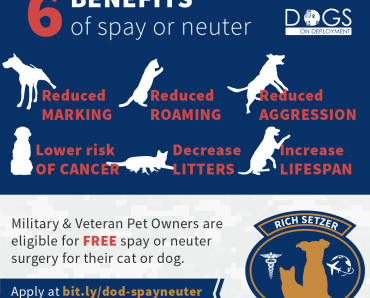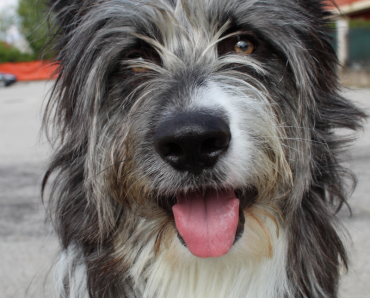Military life is anything but normal; one of those abnormalities is the constant change of scenery. Since my husband and I have been in the military, between the two of us, we have completed six PCS moves (Permanent Change of Station). This week, I’ll be completing our seventh.
Its not just the humans that move, its the dogs too.
PCS moves are chaotic, disorganized, stressful and hard on families. You’ve got to deal with slow-moving administration offices who file your moving paperwork in methods that only were acceptable during days of the stone-age, you’ve got to upfront money for the costs of moving because the money department forgot to file your advances on pay, you’ve got to deal with movers that are paid minimum wage on a government contract where your stuff is in constant threat of being damaged, you’ve got to convince your housing complex to release you from your lease without finding the most absurd reasons to keep your housing deposit, you’ve got to find housing within 10 days at your new duty station that you’ve never been too while also going into work everyday, you’ve got to make sure all your check-in paperwork is in order, etc, etc, etc. Any military member or spouse can tell you PCSing is the least favorite part of military life!
And all this, you’ve got to deal with your fur-kids. They don’t understand what is going on. You’ve brought them to a home where they’ve settled. They’ve thoroughly marked the yard and neighborhood, they’ve developed a relationship with the neighbor’s dog and meet every morning at the fence line to bark for five minutes, they know the sound of your car coming in the driveway, the car ride to the dog park; and the one to the vet, they’ve established their favorite napping spot by the AC vent and their favorite place to pee (which happens to be indoors…). This is their home, then one day, strange people come and put everything in boxes, move it to a big truck and then they’re stuffed in a car full of household goods (the most amount that can fit since you get paid to move by weight), off to a new place.
This can be extremely stressful for animals, as well as people. The move that I will be making this week will be from Pensacola, FL to Corpus Christi, TX so that I can start Primary for Naval flight school. This is the first move that I’ve done on my own, and my first move where I have not only JD, but also Jersey (dog) and Kiki (parrot) tagging along.

JD and Jersey riding shot gun
All week I have been worrying what to do with my dogs once I get to Corpus. Once I get there, I have to check-in to my new command; but I can’t leave JD and Jersey in the hotel room by themselves, since they are not crate trained, so I’ve got to board them; that’s fine, but JD has the WORST separation anxiety of any dog I’ve ever known. So now I’ve removed him from his home, taken away all his things save a dog bed and his favorite toy, dumped him off at a kennel (though the nicest one in town) and will need to leave him overnight so that I can check-in first thing in the morning. And hopefully, through all this, when I check in, my Service Alphas will not be covered in dog hair. (Which inevitably happens every time).
I’ve got a housing complex lined up to move into 10 days after I’ve checked in, which will have a yard for the dogs and my household good should arrive the same day. The dogs should be settled soon, but from now until then, their emotional well-being will be a top concern of mine. But as a responsible pet owner, I’ve gotten my priorities in line and have plans for them throughout this transition.
Now this is where Dogs on Deployment comes in…
Originally starting DoD, our goal was to help military members while they’re on deployment. However, since founding, we’ve realized that military members need help for more things. A large contender against inconsistent pet policies causing families to have to give up their pets until they can find accepting housing, is families who are PCSing and need help.
We see families list their pets for two reasons in regards to PCSing; (1) short term help while they move or deal with quarantine requirements (my situation fits the bill for this type of need) and (2) families that are PCSing to a new duty station and cannot, or choose not to, bring their pets with them.
DoD now gears at helping during PCS moves. Our website states short term boarding is available (3 months or less), but sometimes due to living situations at the next duty station (sometimes required to live in barracks), breed bans, size limitations for travel or numerical limitations (especially for oversea PCS moves), pet owners need to utilize our DoD Boarders for longer commitments until they can receive orders back to the US. We’re here to help then too.

Jersey getting her annual vaccinations
What we want to encourage, is that pet owners no matter where they’re PCSing to or for how long, have plans for what to do with their pets. Here are some tips:
- Get your pet microchipped and update the information to include the address where you’re going to.
- Ensure your pet is up to date on vaccinations in case professional boarding is required. Make sure you plan for this expense. Keep a record of your pet’s vaccination record with you during travel.
- Have housing lined up before you arrive in your new town. Check their pet policy! Make sure they allow your pet’s breed, size and the number of pets you own. Plan to have to put a pet deposit down, usually $100-$400 per pet depending on the housing complex. DoD does not allow pets to be posted on our website because pet owners moved into a housing complex without checking the pet policy first.
- Know where you’re going to stay during your travels and when you get to your new duty station. Check your hotels policy on pets. Some hotels, such as LaQuintas, allow pets and do not require pet deposits! Others require pet fees and have limitations. These fees will not be reimbursed by the military. Usually, when you arrive at your new duty station, you will be required to live at the base’s lodging (BEQ/BOQ, hotel, etc). Check for their pet policy. If they don’t allow pets, make sure you obtain a signed certificate of non-availability so that you can get reimbursed for hotels paid for out in town.
- Research boarding facilities and veterinarians in your new duty station. Call beforehand to see their availability and requirements to board or be seen by them.
- If you think you’ll require the services of a DoD Boarder while you get situated in your new command, register your pet(s) ASAP and interview DoD Boarders before you arrive in the area.
With these key points of advice in mind, we hope that pets will be a major concern when a family executes a PCS move. After all, they are a part of the family, please treat them as such!




